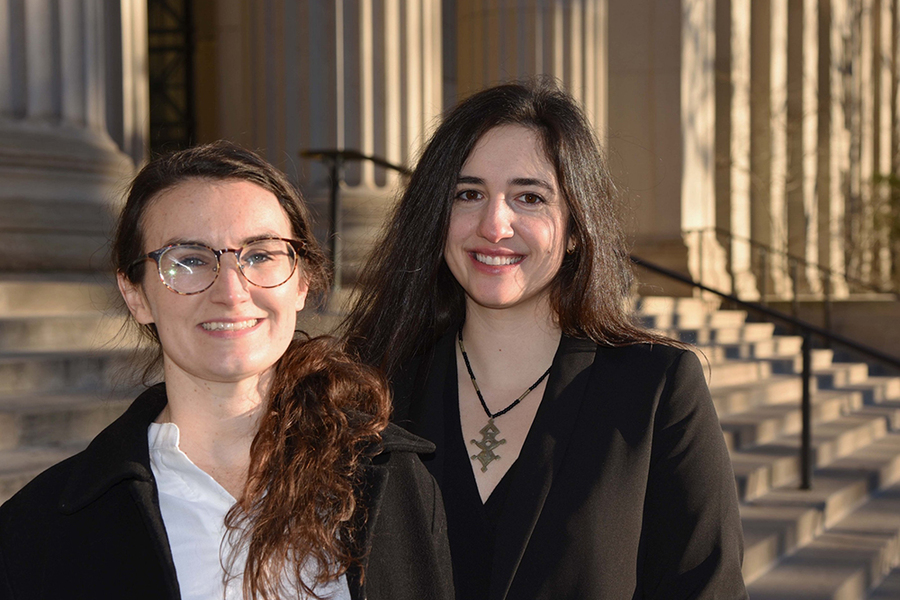Two MIT doctoral students in the MIT School of Architecture and Planning have received the prestigious Fulbright-Hays Scholarship for Doctoral Dissertation Research Award. Courtney Lesoon and Elizabeth "Lizzie" Yarina are the first awardees from MIT in more than a decade.
The fellowship provides opportunities for doctoral students to engage in full-time dissertation research abroad. The program, funded by the U.S. Department of Education, is designed to contribute to the development and improvement of the study of modern foreign languages and area studies. Applicants anticipate pursuing a teaching career in the United States following completion of their dissertation. There were 138 individuals from 47 institutions named scholars for the 2021 cycle.
Courtney Lesoon
Lesoon is a doctoral candidate in the Aga Khan Program for Islamic Architecture, in the History, Theory and Criticism Section of the Department of Architecture. Lesoon earned her BA from College of the Holy Cross and was a 2012-13 Fulbright U.S. Student grantee to the United Arab Emirates, where her research concerned contemporary art and emerging cultural institutions. Her dissertation is titled “Spatializing Ahl al-ʿIlm: Learning and the Rise of the Early Islamic City." Lesoon’s fieldwork will be done in Morocco, Egypt, and Turkey.
“Courtney’s project presents an innovative idea that has not, to my knowledge, been investigated before,” says Nasser Rabbat, professor and director of the MIT Aga Khan Program. “How did the emergence and evolution of a particularly Islamic learning system affect the development of the city in the early Islamic period? Her work enriches the thinking about premodern urbanism and education everywhere by theorizing the intricate relationship between traveling, learning, and the city.”
“I’ll be working in different manuscripts collections in Morocco, Egypt, and Turkey to investigate where and how scholars were learning inside of the early Islamic city before the formal institutionalization of higher education,” says Lesoon. “I’m interested in how learning — as a set of social practices — informed urban life. My project speaks to two different fields; Islamic urbanism and Islamic intellectual history. I’m really excited about my time on Fulbright-Hays; it will be a really fruitful time for my research and writing.”
Before arriving at MIT, Lesoon worked as a research assistant in the Art of the Middle East Department at the Los Angeles County Museum of Art. Recently, she was awarded the 2021 Margaret B. Ševčenko Prize for “the best unpublished essay written by a junior scholar” for her paper “The Sphero-conical as Apothecary Vessel: An Argument for Dedicated Use.” Lesoon earned her MA from the University of Michigan at Ann Arbor, where her thesis investigated an 18th-century “Damascus Room” and its acquisition as a collected interior in the United States.
Lizzie Yarina
Yarina is a doctoral candidate in the MIT Department of Urban Studies and Planning (DUSP) and a research fellow at the MIT Norman B. Leventhal Center for Advanced Urbanism. She is presently co-editing a volume on the relationship between climate models and the built environment with a multidisciplinary team of editors and contributors. Yarina was a research scientist at the MIT Urban Risk Lab, where she was part of a team examining alternatives to the Federal Emergency Management Agency’s post-disaster housing systems; she also conducted research on disaster preparedness in Japan. Her award supports her doctoral research under the title "Modeling the Mekong: Climate Adaptation Imaginaries in Delta Regions," which will include fieldwork in Vietnam, the Netherlands, Thailand, and Cambodia.
“Lizzie’s research brings together three dimensions critical to global well-being and sustainability: adapting to the inevitability of changing ecosystems wrought by the climate crisis; questioning the equity, appropriateness, and relationality of adaptation planning models spanning the global North and the global South; and understanding how to develop durable and just climate futures,” says Christopher Zegras, professor of mobility and urban planning and department head for DUSP. “Her work will be an important contribution toward the long-term health of our planet and of communities working to justly adapt to climate change.”
Previously, Yarina was awarded a U.S. Scholarship Fulbright to New Zealand to research spatial mapping and policy implications of Pacific Islander migration to New Zealand.
“My dissertation project looks at climate adaptation planning in delta regions,” she says. “My focus is on Vietnam’s Mekong River Delta, but I’m also looking at how models that are used in delta adaptation planning move between different deltas, including the Netherlands Rhine Delta and the Mississippi Delta.”
Working on her masters at MIT, Yarina had a teaching fellowship in Singapore, where she conducted research on climate adaptation plans in four major cities in Southeast Asia.
“Through that process I learned about the role of Dutch experts and Dutch models in shaping how climate adaptation planning was taking place in Southeast Asia,” she says. “This project expands on that work from looking at a single city to examining a regional plan at the scale of a delta.”
Yarina holds a joint masters in architecture and masters of city planning from MIT, and a BS in architecture from the University of Michigan.







